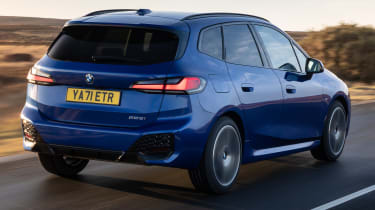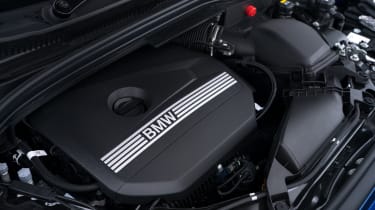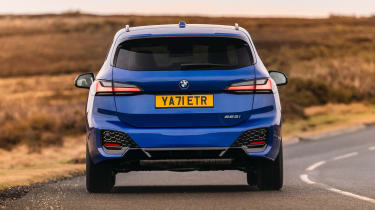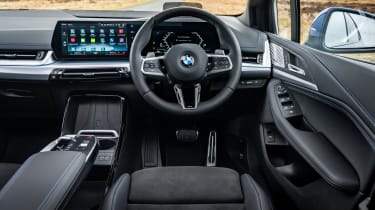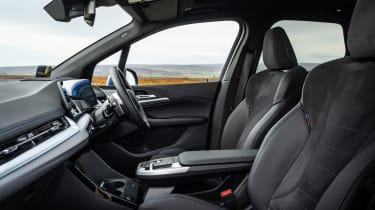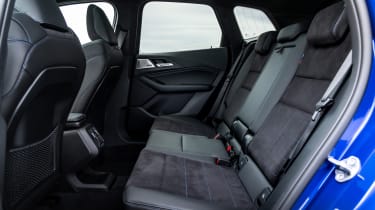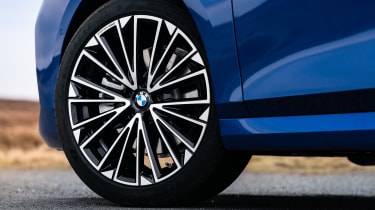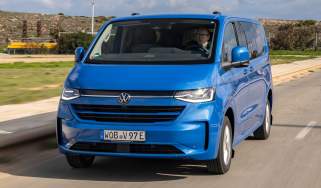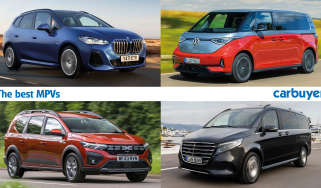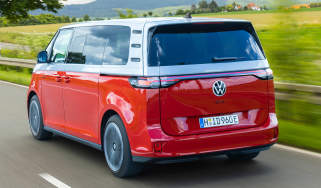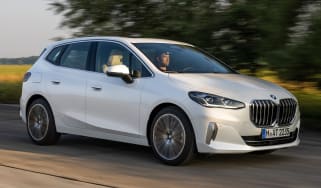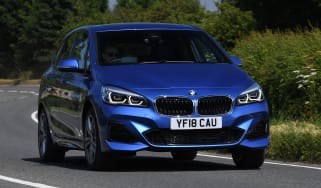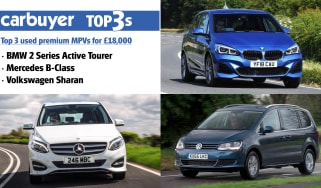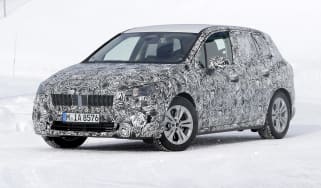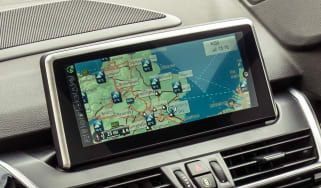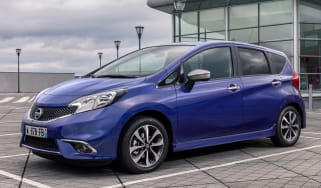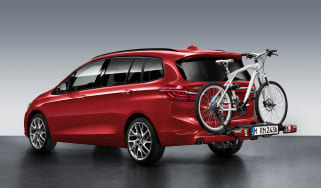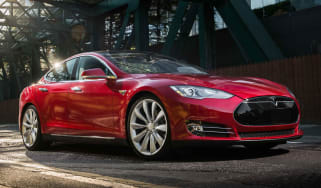BMW 2 Series Active Tourer review – a high-quality, upmarket MPV
“The latest BMW 2 Series Active Tourer hides the latest technology under familiar styling”
Pros
- Slick infotainment
- Great material quality
- Practical rear seats
Cons
- Boot could be larger
- Not as good to drive as other BMWs
- No climate control buttons
BMW surprised many people when it launched the first 2 Series Active Tourer, but this new version isn’t so much of a shock. SUVs may seem to be taking the place of many MPVs, but over 400,000 examples of the car have been sold to date, mostly in Europe.
In fact, it’s a surprisingly important car for BMW, because the brand claims that four fifths of buyers of the last-generation car had never bought a new BMW before. It’s the reason that a second-generation model was launched, even if MPVs are about as fashionable as avocado bathroom suites these days.
 The best people carriers and MPVs on sale in 2025
The best people carriers and MPVs on sale in 2025
That’s also why the new BMW 2 Series Active Tourer looks broadly similar to the previous car, save for a fresh set of larger front grilles, flush door handles and a general spruce-up. Some of the engine range is familiar, too, but the overhaul is far more pronounced than it first appears. A new platform underpins the car and the very latest technology has crept inside.
Despite being one of BMW’s less expensive models, the new 2 Series MPV has the brand’s latest infotainment system – being the first BMW with an engine to feature this tech, as it’s previously only featured on the BMW iX and BMW i4. It looks very glossy, with two large screens curved towards the driver, and you’ll notice that the centre console is a lot less cluttered than in the old car.
The rear seats individually slide and fold, which makes the 2 Series Active Tourer a little more versatile than the Mercedes B-Class, its closest rival. Another option is the seven-seat Volkswagen Touran, but there won’t be a seven-seat BMW 2 Series Gran Tourer this time around. The stretched Gran Tourer perhaps pushed the BMW badge too far, so buyers looking for seven seats may have to pick a Mercedes GLB or something like a Skoda Kodiaq.
More reviews
If you decide the 2 Series Active Tourer is the car for you, there are three trim levels to pick from. Sport starts the range, with sat nav, LED headlights and a reversing camera. Luxury and M Sport lines should give you an idea of each one’s focus, and the latter features bigger wheels and adaptive suspension.
UK buyers especially love the M Sport trim for its racy looks, but that doesn’t translate to a people carrier that’s as fun to drive as a sports car. The 2 Series Active Tourer prioritises space over driving thrills, as it should, and the steering is very light.
It can be quick off-the-line, though. Even the lowest-powered petrol, badged 220i, reaches 0-62mph in around eight seconds, and above that is a more powerful 223i petrol and two high-output plug-in hybrid models. Before it was discontinued in 2023, there was also a diesel model available, the 218d, which returned fuel economy of 57.6mpg. The 220i petrol returns around 10mpg less.
MPG, running costs & CO2
While the latest BMW 1 Series hatchback has grown compared to its predecessor, it’s still a little cramped for many families. The 2 Series Active Tourer is usefully more practical, and at first, it also looks a fair bit more expensive, but all is not quite as it seems. The fact is that while the 1 Series has entry-level engines and trims to bring starting prices down, the 2 Series is offered with a range of more powerful engines and higher-grade trim levels. Once you factor in those differences, the cost difference is actually pretty small.
The BMW 2 Series Active Tourer comes with a selection of conventional petrol and diesel engines, plus a pair of plug-in hybrid versions. These are considerably more expensive to buy, but offer an estimated electric range of up to 55 miles and have the lowest company-car tax rates in the line-up.
But we’d expect most private buyers will pick the petrol engines, which now feature mild-hybrid technology to reduce fuel consumption and emissions. High-milers may well miss the diesel version, which was discontinued in 2023.
BMW’s mild-hybrid assistance has been added to the 220i and 223i petrol engines. The system allows you to coast with the engine off for brief periods, and can predict when to scoop up energy to replenish the small battery. With this electrical help, the 220i can manage up to 47.9mpg, which should perfectly suit drivers with a low or medium annual mileage.
The 223i offers more power from a bigger 2.0-litre engine, and is around £2,500 more to buy, but it doesn’t really compromise too much on fuel efficiency. Its 46.3mpg official figure is still reasonable, and we doubt you’d notice the difference at the pumps. That initial extra payment is more of a stumbling block; we’d stick with the 220i.
The 218d diesel was discontinued in 2023, probably because it didn’t make much financial sense unless drivers were banging in interstellar mileages, which few were. Its impressive 57.6mpg figure was largely cancelled out by the more expensive list price and the loftier price of the fuel itself. The diesel also sat in a high Benefit-in-Kind tax band, so it didn’t really appeal to business users.
Unless you’re planning to rack up lots of motorway miles, the diesel won’t make financial sense. Its impressive 57.6mpg figure will largely be cancelled out by the more expensive list price for many buyers. The diesel also sits in a high Benefit-in-Kind tax band, so is unlikely to appeal to business users.
According to official WLTP figures, the BMW 2 Series Active Tourer 225e and 230e plug-in hybrids can both manage around 55 miles of electric-only running on a full charge. BMW’s figures of 403mpg and 15g/km of CO2 are impressive, although the figures are based on the assumption that you’ll recharge regularly and use battery power as often as possible. Install a 7.4kW home wallbox and the battery will be topped up in 2.5 hours; a domestic socket will take eight hours.
The petrol and plug-in hybrid versions are subject to a slightly discounted VED (road tax) rate compared to the diesels. Cars costing over £40,000 are subject to a surcharge, bringing your annual tax bill to over £500 until the sixth year. It’s a shame the plug-in hybrids fall into this higher tax band, which will negate a lot of the potential fuel savings compared to the petrol or diesel engines.
Insurance groups
The 220i occupies groups 24-25 (out of 50), depending on the trim level you choose. The 223i sits in group 29, and the diesel sits in groups 22-23. With the hybrids the 225e has groupings of 27-30, while for the 230e, it’s 31-33. Version-for-version, that’s all broadly similar to the BMW 1 Series and the Mercedes B-Class.
Warranty
A three-year, unlimited-mileage warranty (with roadside assistance) is included with every new BMW. It’s the same length of deal you get with a Mercedes B-Class. The plug-in hybrids feature a specific six-year/60,000-mile battery warranty that covers it dropping below a certain percentage of its original capacity.
Servicing
BMW service intervals are defined by the type of driving you do, and the car will let you know when it’s time for a visit to the garage. You can go up to two years between services, although lots of stop-start driving will shorten that. A service plan is available for £20 per month, and includes one MOT, free fluid top-ups and sat nav map updates. If you sell your car, the plan is transferable to another new BMW.
Engines, drive & performance
Because the 2 Series Active Tourer doesn’t sell in quite the same numbers as the BMW 1 Series, there are fewer engines to choose in the MPV. The available engines make the 2 Series seem a little overpowered on paper, but it should also mean that no version feels sluggish. All versions get an automatic gearbox.
M Sport cars get sporty lowered suspension, and there’s no option to swap it for the standard setup you get on Sport and Luxury versions. This can be a little firm at times, so it’s worth taking a test-drive to make sure that you don’t find it uncomfortable.
The 2 Series Active Tourer has a very different brief to something like the BMW 4 Series, or even the 1 Series, because it puts practicality ahead of driving thrills. This is reflected in the way it drives, with super-light steering that’s useful for parking and manoeuvring but short of feel on faster roads. Sport mode adds weight to the steering, but not to the same effect as sportier models.
That’s not to say that BMW hasn’t paid attention to the driving experience. The automatic gearbox is smoother and more responsive than before, while the engine mounts have been redesigned to reduce vibration. With less road noise getting into the cabin than in the Mercedes B-Class, the 2 Series Active Tourer is a hushed and relaxing car for long journeys.
Underpinning the 2 Series is a new platform, called FAAR. This architecture is capable of underpinning fully electric models, but for now the car is offered with mild-hybrid and plug-in hybrid engines.
BMW 2 Series Active Tourer petrol engines
The cheapest 220i petrol engine is likely to make up the highest proportion of petrol sales. It’s a 1.5-litre turbocharged engine with mild-hybrid technology to reduce emissions, and produces 168bhp. That’s plenty for a car like this, and results in a brisk 0-62mph time of 8.1 seconds. Used in a range of cars including the MINI and the BMW X1, this engine gives a refined drive and a great mix of efficiency and performance.
Above it is a new 2.0-litre 223i version, with power boosted to 215bhp. A second is chalked off the acceleration time, and it also includes the mild-hybrid assistance. The 48-volt hybrid system gives a small power boost, and also enables coasting with the engine turned off. It can predict when to collect lost energy, too.
The power on offer in the 223i is largely unnecessary, but you may find that the 223i is slightly smoother than the 220i. However, given the price jump to the bigger engine, we’d stick with the 220i and use the money saved for a nice holiday.
Diesel engine
When it was launched, the 2 Series Active Tourer catered for diesel buyers with a 218d version, which had a 148bhp 2.0-litre diesel. It managed 0-62mph in a respectable 8.8 seconds, and offered the best fuel economy out of the standard petrol and diesel engines, but even so, it was dropped from the range in 2023.
Hybrid engines
Following the petrols and diesel, two plug-in hybrid powertrains arrived later to bolster the line-up. Both the 225e and 230e have four-wheel drive (the rest of the engines are front-wheel drive), and they get 242bhp and 322bhp, respectively. Even though they’re heavy with the added weight of the batteries, both are quick off the line. The 225e hits 0-62mph in 6.7 seconds - about the same as a Ford Fiesta ST hot hatchback - while the 230e does the same sprint in 5.5 seconds, which is absurdly quick for a family minibus.
Interior & comfort
The new BMW 2 Series Active Tourer is among the first cars to get BMW’s latest iDrive 8 media system, which has been updated with extra functionality. Two screens are joined together in a curved unit, one for the driving information and one for the navigation and infotainment functions.
BMW doesn’t seem to have skimped on many of the materials. A lot of soft-touch materials and solid-feeling panels are fitted inside, so the 2 Series feels like a quality product. It’s why the five-seat 2 Series is a similar price to seven-seat SUVs like the Skoda Kodiaq and SEAT Tarraco.
BMW 2 Series Active Tourer dashboard
One of the first things existing owners will notice in the new car is how spacious the front feels. This time around, BMW has made the centre console a lot less cluttered and more open, giving an airy feel. Ahead of the cupholders is a place to put your phone; higher-spec cars get a wireless phone charger here, too.
The central armrest now appears to float, with an integrated cubby being replaced by an open storage area. Poking out the front of it is a control panel with a number of buttons, putting them within easy reach and decluttering the dashboard.
You will have to control the air conditioning through the 10.7-inch infotainment screen, though, and BMW has done away with the old rotary infotainment dial. Now, you’ll be prodding the touchscreen a bit more, which some buyers might find frustrating. We liked the sensible rotary dial as it was easy to use and didn’t put greasy fingerprint marks on the screen.
The infotainment screen and the 10.25-inch digital dial cluster next to it both feature impressively sharp graphics, while the usability of the touchscreen is improved by easy widgets.
Equipment
The line-up kicks off with the BMW 2 Series Active Tourer Sport trim, and even this version has a strong standard equipment list. Those large screens are standard (you have to upgrade for the best screens on the Mercedes B-Class), while other features include LED headlights, alloy wheels, two-zone air conditioning, cruise control and a reversing camera.
Opt for the Luxury spec and you get heated leather seats and aluminium trim. We think the Luxury suits the 2 Series Active Tourer quite well, but the M Sport is likely to be popular with UK buyers. It brings a more sculpted body kit, bigger wheels, adaptive suspension and better headlights.
Options
BMW has often been known for its lengthy options list, and there are plenty of extra features that can be added to the 2 Series. A Comfort Pack adds electric seats and a heated steering wheel, while there are two Technology Packs that add features like keyless entry and folding wing mirrors.
Some of these features can be added individually, and you can also add things like a panoramic sunroof, a larger fuel tank and a Harman Kardon surround-sound system.
Practicality & boot space
From some angles, the BMW 2 Series Active Tourer looks quite like the 1 Series, and it provides an extra dollop of practicality over the smaller hatchback. It’s more versatile and sits slightly higher up, making it easier to get in and out. With its sliding rear seats and storage compartments, the 2 Series is more practical than the Mercedes B-Class, although its closest rival does have a slightly bigger boot space.
There’s no hint of SUV styling here, as buyers after a chunkier look are served by the BMW X1. Roof rails come as standard on the 2 Series, though, improving its practicality by allowing a roof rack to be fitted if you need the extra space or want to carry bikes.
For this new generation, the five-seat Active Tourer goes it alone. BMW isn’t replacing the seven-seat Gran Tourer, which has now been discontinued, so its remaining seven-seaters are the much costlier BMW X5 and BMW X7 SUVs. As such, if you occasionally need three rows of seats, you’ll want to check out the Volkswagen Touran, Mercedes GLB or Peugeot 5008.
BMW 2 Series Active Tourer interior space & storage
Compared to the old 2 Series Active Tourer, the new model has grown in each direction: it’s taller, wider and longer, with a longer wheelbase (the distance between the axles) than before. That means you get a little extra rear-seat space, and the seats themselves are well configured.
Each one folds individually and can be slid forwards and backwards to suit your requirements. Fully slid forwards, legroom is rather tight, but the boot space becomes bigger. With the seats in their normal position, there’s plenty of space for legs, elbows and heads.
The rear seats are also mounted slightly higher than the fronts, to give a better view out. But the car’s rising windowline means that young children are unlikely to be able to see out of the back windows.
The 2 Series Active Tourer does well for interior storage. The door bins are generous and there’s a big storage area between the front seats, even if it is now visible to passers-by. There’s now a small extra storage slot beneath the armrest padding, while the slot in front of the cupholders should hold even the largest phones.
Boot space
At 406 litres beneath the parcel shelf, the boot is only slightly bigger than that of the 1 Series, but it’s a good space nonetheless. That figure is for the plug-in versions; the mild hybrid petrol has 415 litres, while the diesel models are more spacious again at 470 litres. With the rear seats folded flat, the diesel 2 Series Active Tourer offers up to 1,455 litres of space if you fill to the roof, while the plug-in hybrids offer 1,370 litres and the petrol 1,405 litres.
Towing
BMW hasn’t released towing capacity figures just yet, but a tow bar costs around £800 on the options list.
Reliability & safety
The latest version of the BMW 2 Series Active Tourer MPV has only recently hit the road, so it’ll be a little while before we can gather information on how reliable it is. But initial signs are reasonably promising, considering that the 2 Series is loosely based on the BMW 1 Series hatchback. The 1 Series boasts good safety and decent owner satisfaction data, so hopefully the 2 Series Active Tourer will follow suit or maybe even improve on it.
BMW 2 Series Active Tourer reliability
In our 2023 Driver Power owner satisfaction survey, the Active Tourer didn’t feature in the top 75 cars, but the closely related 1 Series did - just - featuring in 71st place overall, down from its ranking of 54th the year before. It placed slightly better for reliability, ranking 65th.
As a brand, BMW finished 21st out of 29 manufacturers in 2023. Just over one in five owners reported a fault in the first year of ownership, which is a little higher than average.
Safety
The 2 Series Active Tourer managed a five-star rating in Euro NCAP crash tests, with impressive scores for adult and child occupant safety, although it only managed a 76% score in the pedestrian safety category. The BMW’s safety assistance technology was also deemed to be particularly strong, thanks to standard equipment including autonomous emergency braking and lane-keep assist, plus the usual array of airbags and ISOFIX child-seat mounting points.
Which Is Best?
Cheapest
- Name220i MHT Sport 5dr DCT
- Gearbox typeAuto
- RRP£34,665
Most Economical
- Name225e xDrive Sport 5dr DCT
- Gearbox typeAuto
- RRP£40,070
Fastest
- Name230e xDrive Luxury 5dr DCT
- Gearbox typeAuto
- RRP£44,825

